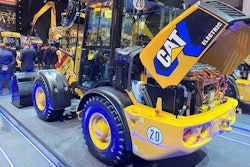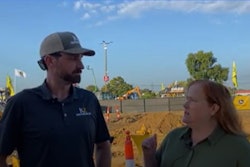
The Equipment Today team talked with industry leaders to examine the construction industry in 2023 and consider what they expect in 2024 for the State of the Industry Report. In this article, Wilfried Aulbur, senior partner with Roland Berger, shares his insights on the industry.
What were some challenges for the construction industry in 2023?
In 2023, the supply chain remained an area of concern, especially for the first half of the year. While the overall situation improved, for example, on semiconductors, shortages remained and had an impact on the supply chain, which propagated into manufacturing.
Economically, the U.S. was solid and provided good growth and margins. Europe faced challenges [because of] the war in Ukraine, and this is not likely to change any time soon. China is struggling to come out of COVID under a significantly different policy framework than in the past. A reduced market at home increases the pressure for Chinese original equipment manufacturers (OEMs) to find export opportunities, which leads to more competition in emerging markets such as Africa but also in developed markets like Europe and the U.S.
In other regions, markets also shifted. For the foreseeable future, Brazil has displaced the U.S. as a soy exporter to China. This drove significant deforestation of the Amazon and increased the relevance of the Brazilian market for agricultural OEMs.
Electrification is moving more to the forefront with more vehicles being offered that have alternative powertrains. In compact construction equipment, electrification seems to be a possibility. In medium and large equipment, alternative solutions such as biofuel, renewable diesel or RNG are likely better and faster to implement alternatives.
In what technological areas do you see the potential for the most innovation in 2024?
Besides the focus on alternative powertrains and sustainability, the question of the Internet of Things (IoT), data and software that drives positive business outcomes will continue to be at the center of innovation for the agricultural and construction industries. The importance of this cannot be understated. Some examples include: the investments that John Deere has been making in this area, CNH with its acquisition of Raven and recently AGCO with its acquisition of the agricultural business of Trimble.
Which construction sectors face the most hurdles in the move toward electrification? Alternative fuels? Automation?
If we look at compact construction equipment in Europe and the U.S., there is a case to be made that, given lower battery costs and increased regulatory pressure on fossil fuels, these solutions will be total-cost-of-ownership-competitive in the future. They mostly operate in urban environments, so we should be able to find solutions for the charging infrastructure as well.
Off-highway is just a fraction of the overall automotive industry, so we won’t face a situation where significant additional generation capacity has to be put in the ground to serve our industry, so this should not become a major hurdle. However, most of the emission from off-highway machinery comes from large machines in emerging markets. Here, it is much more conceivable to get to decarbonized solutions by [using] biofuels, renewable natural gas (RNG) and renewable diesel. An “electrify everything” approach will not lead to results in the timeframe that we need to combat climate change.
How are the Industrial IoT, software and connectivity affecting the industry?
The overall efficiency of the industry will continue to improve. As we get more transparency across processes and machine performance, we will be able to continue to optimize the way we do business and take out time as well as cost. We will be able to sweat assets for longer as overall maintenance practices will improve [because of] predictive maintenance. Increasing automation and assisting operators in their daily work will make it easier to attract talent to the industry.
In what ways do you expect the infrastructure bill to affect the construction industry and contractors?
The bill has been a big positive for the U.S. economy. Not only does the construction industry benefit from infrastructure investments, but the overhaul of our infrastructure also benefits logistics and other industries, reducing costs and improving turnaround times.
What will be the biggest challenge in 2024 for the industry?
We will see a cooling in demand after some stellar years, which will lead to some adjustments in the industry. Yet, the economy remains strong, and 2024 should be a good year for the construction industry.



















